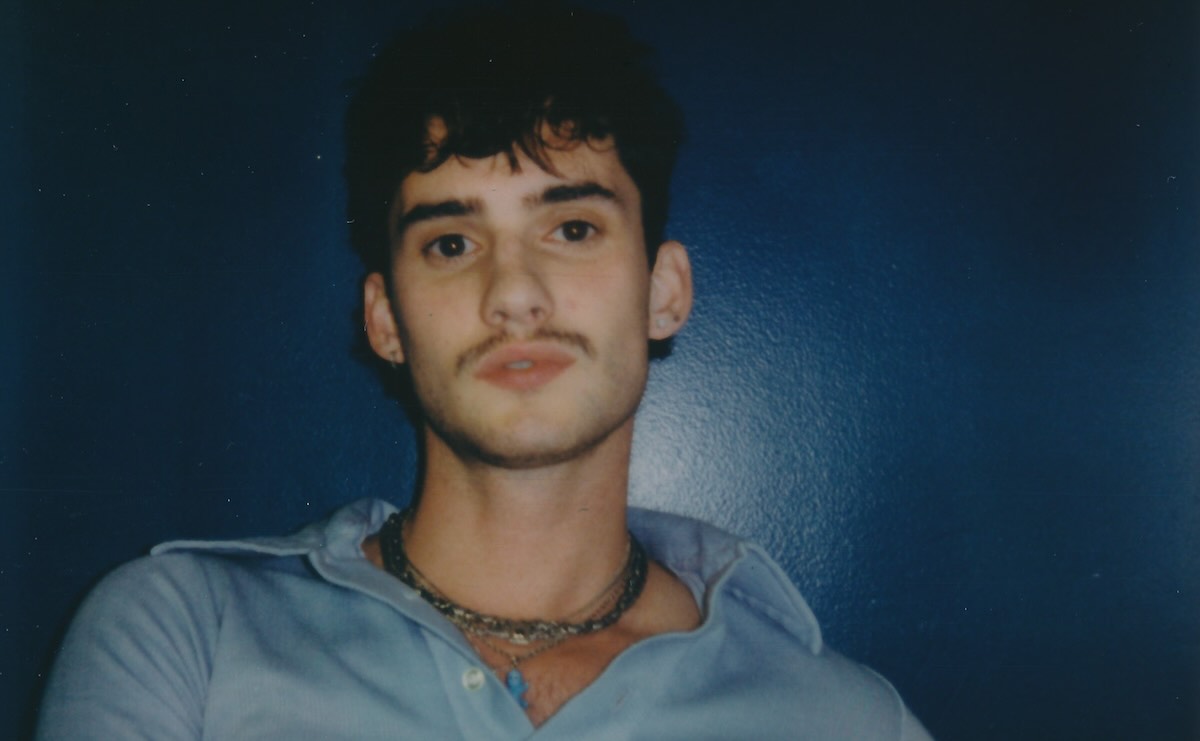
Following the surprise release of his “Post-Party Mixtape,” released as a collaborative project under the group Rainshop with best friend Erez Levin representing Magic Toaster Band. Motown singer-songwriter Charlie Burg chats with Variance's Ethan Ijumba to chat about his recent international tour, his current state as an artist, and how his art has evolved regarding his composition process. Be sure to read their full Q+A between the two below and stream his latest single, “Before We Step Inside,” on all platforms.
Ethan Ijumba: So, regarding your musical upbringing, you were raised in Detroit but currently live in Brooklyn, New York. Having those two specific cities that are so musically based and inclined to give you so much influence, what was the upbringing like of having an evolution aspect as well as having such a vast musically based environment in your life and your upbringing?
Charlie Burg: Yeah, I was raised rummaging through my dad's vinyl collection of Al Green, The Temptations, Edwin Starr, and even outside of stuff on the label Motown like Steely Dan, Hall & Oates, Joni Mitchell. I got different flavors of influence from my parents and my grandma, who would play jazz standards. So, I'm actually about 20 minutes northeast of the city of Detroit. Everyone knows the city eight or the movie Eight Mile. I grew up closer to 14 Mile, which is how the city is set up. But I wasn't entrenched in a live music scene growing up. I just took my guitar and played on the sidewalks and street corners, and that's how I got my chops up. Being in front of people, taking covers and requests, and it wasn't until I started playing in bands doing house shows and playing small venues that I became in New York that I became privy to what a music community is like. Upstate New York, Syracuse, is where I went to university. That's when I understood what it meant to be part of something bigger than you in the context of music. So, of course, New York City has such a rich history, and New York as a state has such a rich music history. But I'm still finding my place there.
EI: So now, at this point as an artist, you've really built a huge following. You've found your niche and more into combining the sounds and your influences, putting your own spin on it, and making music that you can be recognized as by Charlie Burg, when it comes down to finding that and crafting your craft. Do you feel that the music you're making isn't only a reflection of just you? But do you feel like it's a reflection of just a lot of the other stories with where you’re at in life, such as the people you've encountered and impacted in it?
CB: So, traditionally, as a songwriter, I greatly valued my interpersonal interactions with others. I find a meaningful thread in that part of my life; however, as I get older and look to challenge my process and craft a little more. I'm looking more inward and reflecting on my perspective on the human experience and how I perceive getting older and going through life. I've offered myself a little bit over the years by focusing more on life through others' eyes as opposed to my own.
EI: So, with that said, your latest single, “Before We Step Inside,” details about stepping into a party and enjoying everything despite the sadness; where did the influence come from, and how did it come about?
CB: That song is actually an old song of mine. It is new to the world, but I wrote it about 3-4 years ago. It's been in the vault for a while, but I came back to it as I dove through my archives, and I think it's important for all artists to have a vault or an archive of unused material. But anyway, I was diving through and rediscovered that tune, and it resonated with me for some reason. I decided that people deserved to be out in other people's hands, in the world's hands. It reflects a certain young existential dread that everyone goes to their own version of in college and juxtaposes with the pure release and ecstasy of dancing and celebration. It was an interesting position for me. To me, it is kind of melancholy, where it's a thoughtful, straightforward song. It's not something that I didn't work very hard to write that song, like some lyrics that I've labored over to get the nuances across. But I barely even thought twice about that one once I wrote it. It's interesting because it's an old song, and what's interesting about that song and relates to what I was saying before is that it's the last stand and almost a bygone era of my songwriting. I put it out almost as a way of hanging on to the time I wrote it. It's a way of commemorating or trying to hold down with all ten fingers to that time in my life, but after releasing it, I realized that it's the very thing holding me back in songwriting and life. So, it was just like the world may not feel it, but as the person who wrote it, I understand that song has a very symbolic deliverance from who I used to be.
EI: So, from what your songwriting was before, do you feel that you closed a chapter as an artist or as a person in a way from how it used to be to what it is now?
CB: I think my frame of mind at any point in life is always reflected in my art. But, if I'm stuck lyrically and stuck in a certain mode of storytelling, then I'm stuck as a person. Some artists can sever themselves from their expression; I admire and sometimes envy that. But I find it difficult not to associate who I am and how I feel with how my music is going, and my art is being made. So it's a good and a bad thing. Generally, it's about moving on stylistically as a person. I just turned 27 and have a new zoomed-out perspective on how I got here.
EI: Do you have a clear-cut vision of exactly where you want to take your art? Now that the previous chapters have closed? Or do you want to produce and create art differently than how it was before?
CB: I'm taking the winter to figure that out. I'm moving to Paris in about five days. So I’ll be there for about maybe five-ish months or so. I haven't really bought a return flight yet, but I'm switching up on my surroundings, taking a step back from what I know, and plunging into a little bit more of a challenge, and the vision is basically to allow myself to create boundlessly again.
EI: So basically, to produce music without having exterior voices in your head about how to do it or create music without feeling stuck again?
CB: Well, not even music. I just want to express myself outside of music in a pure way. When you make music in your career, you start to connect it with. You know who you are, and to touch back on what we said earlier, sometimes It can be toxic when you think if my music is not good, then I must not be good as a person. It's like when you get into these ruts where you're drawing connections between the wrong things, and I'd like to take a step back from music because sometimes you need space from what you love to really understand it again.
EI: So, when it comes to taking space, do you plan on going to Zero Dark 30 mode by taking a step back from creating music within that time? Or do you feel like you’ll be strictly a listener again and just enjoy what's on your playlist and such?
CB: I think my brain is telling me to, or my heart is to challenge myself a little bit and push it away for the moment. Having to push away those urges because I never have before in my years of being alive; I've never not followed a musical urge…It's like you; you don't realize you don't know what you got till it's gone. So it's almost like forcing that to be true. It's like I want to realize, and I want it to be gone to realize its value once more.
EI: To go along with that, you're going on a personal journey of well-being and health by pausing on music. This past November, you traveled around the world from Japan, Indonesia, and the Philippines with the Blue Wave Band.
CB: Yep. That's my touring band.
EI: When it comes down to touring, what's your favorite part? And what's your least favorite part about the touring aspect?
CB: I'd say my favorite part about touring is saying hello to people after the show at the merch booth. It can be very exhausting and overstimulating, but those moments are when I realize just how far what I do reaches people or just how far my music reaches. When you look somebody in the eyes, and they have a voice, and they say your music has really meant a lot to me. It's a reminder of what I'm positive about when it comes to all this. Then, something that challenges me or that I dislike about touring is that I always get sick. I don't know why; my immune system's a little screwy.
EI: So then, with everything you enjoy touring, when it comes down to performing on stage with the Blue Wave band. Do you have a favorite song you love performing that many people may not know, realize, or recognize?
CB: I love to do “97 Avalon”; that feels right. I definitely wrote it for live, so it's fulfilling to fulfill that dream every time I play a show. Outside of that, I love to do oldies and see who knows them; there's a song called “A Letter From Last Summer.” That is one of my oldest songs, and it's pretty short, and sometimes I'll pull it out. There's also another one called “Busbeat,” and we have a lot of fun doing that one. It's like from the days when I used a program called Ableton. I remember finishing that song and writing it in the shower and then finishing the production in college and being like dude, this is sick. I didn't even think twice. I just put it out, and those were the days.
EI: Has it not been like that for you at all? Because you mentioned how you want to make music boundlessly without barriers anymore, what's your process now?
CB: My relationship changed with my songwriting over the pandemic. There are reasons many or most artists can relate to the purity or lack of effort that went away because you're sitting at home all the time. It's like the world's crumbling around you; sometimes, creating art feels trivial. Definitely, my relationship with the act of creating has changed, and I'm sure I can attribute it to many, many things, but I'm really determined and excited to get it back because I know as long as I walk this earth, I know why I was put here, which sounds a little more, religious and spiritual than I usually tend to get. But I know that I'll never stop searching for that again. It's like a fulfillment aspect where things have changed, which is normal. We live like seasons; some days, we're gonna have our spring, some days will be summer, winter, and fall, and no matter what, we're still us.
EI: So when it comes down to the music that we've already gotten from you before, do you feel that the music you've been making as of lately? In terms of the craft and composition, what has the feeling been like regarding what you're making now?
CB: My vault is at a point where I could drop four 20-song albums this year. I have a lot of stuff cooked and ready to serve, but I know there's a new frontier for me. There's a new life form of sound and something new inside of that. It requires a bit of self-study and reflections come out of me, and I want to wait to find that to put out music again.












